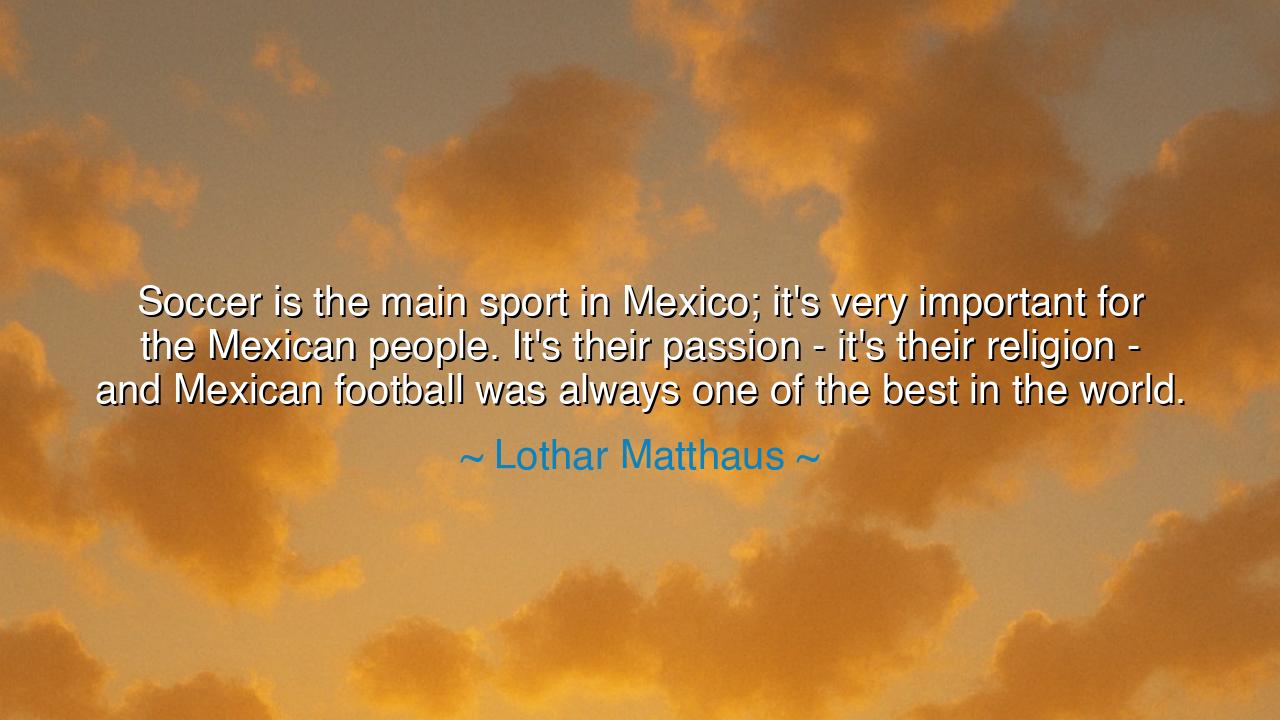
Soccer is the main sport in Mexico; it's very important for the
Soccer is the main sport in Mexico; it's very important for the Mexican people. It's their passion - it's their religion - and Mexican football was always one of the best in the world.






In the vibrant landscape of human culture, there are forces that shape societies and bind communities together. Among these forces, passion holds a unique and powerful place, capable of uniting people across borders, time, and differences. Lothar Matthaus, the legendary German footballer, spoke with profound insight when he observed, “Soccer is the main sport in Mexico; it’s very important for the Mexican people. It’s their passion - it’s their religion - and Mexican football was always one of the best in the world.” These words reflect more than just the popularity of a sport—they speak to the soul of a nation, to the unbreakable bond between Mexican identity and the sport of soccer, which transcends mere competition and touches the deepest emotions of its people.
In the ancient world, communities were often defined by their shared practices, rituals, and celebrations. For the Greeks, it was the Olympic Games; for the Romans, it was the chariot races in the grand coliseums. These events were not just games but cultural touchstones that defined the very essence of their societies. In Mexico, soccer has become that cultural touchstone—a sport that unites the people, ignites their passion, and offers them a sense of identity and purpose that transcends the ordinary. Matthaus’s words echo the ancient understanding that sports, like the rituals of old, can serve as a reflection of a nation’s values, spirit, and resilience.
Consider the ancient story of the Maya, a civilization that revered the game of tlachtli, a ball game that held religious and cultural significance. Played in large, ceremonial courts, the game was more than a mere contest of strength and skill—it was a symbolic act, a ritual of life and death, reflecting the eternal struggle between the forces of light and darkness. For the Maya, the ball was sacred, and the game itself was a sacrifice to the gods. Similarly, in Mexico today, soccer is not merely a sport played on fields; it is a sacred event, a manifestation of national pride, spirit, and devotion. The players become heroes, the teams become symbols, and the fans become part of a shared ritual that stretches beyond the match itself.
Lothar Matthaus’s comparison of soccer to religion in Mexico speaks to the depth of the emotional and cultural connection between the people and the game. In Mexico, soccer is not just an entertainment; it is a lifeblood that flows through the veins of the nation, connecting its people to each other, to their history, and to their dreams. The way the Mexican national team is celebrated during World Cup events is a testament to this devotion. The streets are filled with colors, chants, and fervent belief, as soccer becomes the religion that unites even the most distant communities, transcending social and economic boundaries. The game is more than a sport; it is a ritual, a celebration of life, where victory and defeat are deeply felt in the hearts of all.
A powerful example of this passion is seen in the iconic performance of the Mexico national team during the 1986 FIFA World Cup, held in Mexico itself. That year, the country hosted a tournament that captured the imagination of the entire world, and the Mexican team’s performance was a moment of national pride. The excitement, the joy, and the euphoria felt by the people during this event was a reminder that soccer, much like ancient rituals, can be a transformative experience—one that shapes the collective identity of a nation. Even though Mexico did not win the tournament, the passion displayed by both the players and the fans reaffirmed that soccer is more than just about winning; it is about belonging and connection.
Matthaus’s reflection also points to something more universal than the Mexican devotion to soccer—it is about the power of sport to unite and inspire. As much as we might focus on the competitive aspect, sport, in its purest form, is a celebration of the human spirit. It is a reflection of our desire to challenge ourselves, to overcome obstacles, and to share those triumphs with others. Whether it is the pride of the Mexican fans or the determination of the players, soccer, like all great traditions, serves as a reminder of the shared humanity that exists within us all. Through sport, we find not just competition but common ground—a space where individuals from all walks of life can come together and share a common purpose.
The lesson that Matthaus imparts is one of devotion—not just to the sport, but to whatever ignites the passion within us. Whether it is soccer, art, religion, or any other pursuit, it is the depth of devotion and the emotional connection that give meaning to these endeavors. As we move through our lives, we should seek to find those things that bring us together, that allow us to express our deepest values and beliefs. Let us embrace those passions—the things that stir our hearts and shape our communities—and allow them to guide us toward a deeper sense of purpose. For it is through these shared passions, like the love for soccer in Mexico, that we find a connection to something greater than ourselves—a shared humanity that binds us all.






AAdministratorAdministrator
Welcome, honored guests. Please leave a comment, we will respond soon